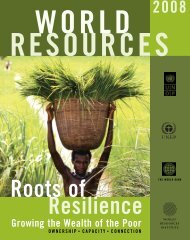jp8589 WRI.qxd - World Resources Institute
jp8589 WRI.qxd - World Resources Institute
jp8589 WRI.qxd - World Resources Institute
Create successful ePaper yourself
Turn your PDF publications into a flip-book with our unique Google optimized e-Paper software.
WORLD RESOURCES 2005<br />
168<br />
titling program, designed to be fairer and more efficient, which is<br />
expected to reduce the cost of titling a parcel of land from US$110<br />
to under $40. Proposed legal reforms would consolidate 25 different<br />
laws that directly affect land titling, and alternative dispute<br />
mechanisms will be used to resolve issues that prevent titling.<br />
Advanced information technologies, including digital mapping and<br />
integrated data management, will be used to accelerate land titling<br />
and registration and make the land-management system more<br />
transparent and accessible (Sri Lanka 2002:62).<br />
Honduras outlines very specific actions, with associated<br />
budgets and deadlines, that will be carried out to improve equity<br />
and security in the poor’s access to land. Key elements include<br />
completing a nationwide cadastre (survey) of forest and agricultural<br />
lands to strengthen the legal basis for land ownership,<br />
modernizing the rural property registry to provide a modern tool<br />
for guaranteeing the accuracy of land tenure arrangements and<br />
land transactions, and an expanded program for titling rural<br />
properties for small farmers, ethnic groups, and independent<br />
campesinos (Honduras 2001:70).<br />
Bolivia plans to regularize the titles to all rural land by<br />
2006, including measures to simplify the procedures for registering<br />
land titles and property rights by merging the systems for<br />
physical and legal registration of property (Bolivia 2001:110).<br />
4. Decentralization and Community-Based Natural<br />
Resource Management<br />
Almost all PRSPs refer to decentralization and its importance for<br />
improving governance and reducing poverty. Often the discussion<br />
is rather general, however, and mentions only one or two<br />
sectors—usually education and health. PRSPs should incorporate<br />
analysis of important aspects of decentralization issues that<br />
are directly related to natural resources management and opportunities<br />
to enhance environmental income for the poor.<br />
Among the current crop of PRSPs, a few contain welldeveloped<br />
discussions of decentralization for the management of<br />
environmental resources. A few also outline ways in which the<br />
government proposes to work with local people to increase rural<br />
income through community-based management of forests,<br />
fisheries, and other environmental assets.<br />
Bolivia’s PRSP explicitly addresses the implications of<br />
decentralization for environmental management. The strategy<br />
refers to institution-strengthening initiatives aimed at ensuring<br />
that municipal governments will have the capacity to carry out<br />
new responsibilities to implement environmental policies and<br />
standards. It also highlights the ongoing role of Bolivia’s central<br />
government in important environment-related planning<br />
functions, including the development of diagnostic assessments,

















